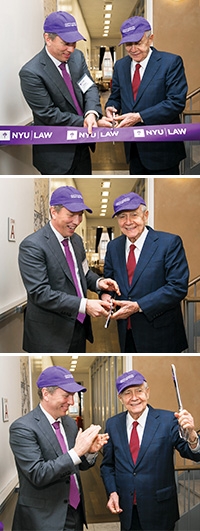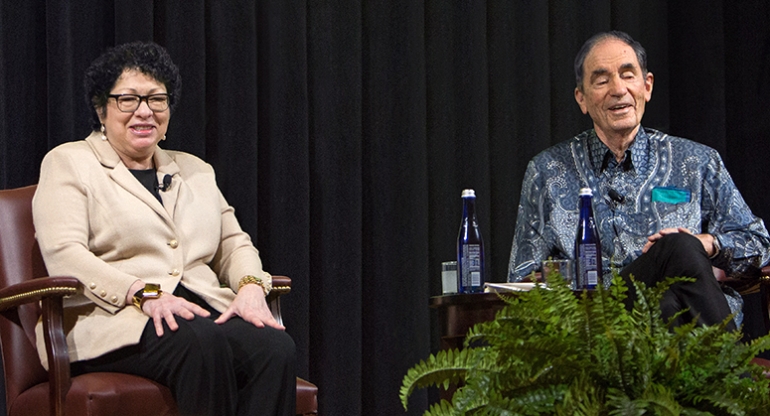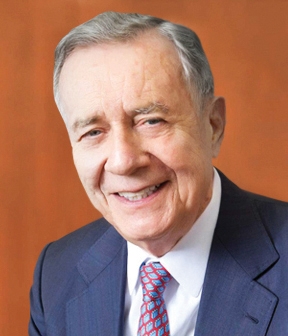A New Global Step
NYU Law opens more doors to the world with the launch of the Guarini Institute for Global Legal Studies
Last April, the Law School announced the opening of the Guarini Institute for Global Legal Studies with a celebration at 22 Washington Square North, the institute’s new home. Supported by a $20 million gift from Frank J. Guarini ’50, LLM ’55, the Guarini Institute extends the Law School’s international reach by building on existing programs and introducing new ones. Benedict Kingsbury, vice dean for global programs and Murry and Ida Becker Professor of Law, who serves as faculty director of the institute, sat down with editorial director Emily Barker to talk about the ingredients for “Global 2.0,” the intersection of transnational law and technology, and why it’s more important than ever for the Law School to engage internationally.
Why do you think this is the time to start an initiative like the Guarini Institute?
From the standpoint of people living in the United States, the nature of global order since 1945 has been substantially aligned with US visions of the world, with a particular kind of liberal capitalism. Especially once the Cold War ended, the sense that American or North Atlantic values could be made global became very strong.
Quite rapidly, probably from the early 2000s onward, that understanding began to dissipate. Over time, there emerged somewhat different models. In particular, the spectacular increase in power and vitality of China has begun to project a different view of the state and society. And alongside that is the importance of India, the gradual flourishing of some parts of African societies, and the energization of Southeast Asia and parts of Latin America, and different engagements with Russia.
We are seeing increasing authoritarianism in some parts of the world, and a multiplicity of models of governance. We see now globalization as it has been—the continuous flows of capital and the connectedness and interdependence of markets and strong communications—and at the same time there is now deglobalization, including the rise of populist leaders and the exit of countries from treaties that in the past they would have been part of, such as Britain going outside the European Union.
The nature of the international orders in which this generation of students will be working and living is much more complicated. Some old platitudes are now exposed for being that. Some real challenges are clear to everybody, and some are incipient, and they’re going to become very difficult.
We believe that this is exactly the right time to be engaging with the world, and the Guarini Institute is well placed to do it. We’ll be trying to think about the way that the world’s going and work through big ideas, recommendations for the world that’s being made and that we all ourselves are part of making.
Will the Guarini Institute focus on any particular parts of the world?
We don’t have the aim of being a regionally focused enterprise. NYU Law does have a lot of historic connections across the North Atlantic. The importance of China in the world is reflected in our programs and thinking—as is, increasingly, the importance of India, Indonesia, Japan, and other East Asian countries.
We also would very much like to deepen our real connections with Latin America. We have terrific groups of LLM students from many of those countries. Brazil is the second largest LLM cohort after China. We could be more systematic about our connections and joint projects in Latin America, including Mexico, which is one area where we hope we can move forward quite quickly.
We are already working in Guarini with some Mexican scholars doing that. We hope over time to be able to do more work with African universities, African scholars, African students, and NYU Law students working in Africa. We believe we can do a lot to really build there.
Can you tell us about the Guarini Institute’s mission, and how it fits into NYU Law’s existing international programs?
What we are trying to support through Guarini is what you can call Global 2.0 for NYU Law. Since 1995 the Hauser Program has worked to bring outstanding people to New York and to make a rich, intellectually vibrant community here that brings the law and practice of other countries and international, transnational issues into the now-daily legal activities of all sorts in the school.
So the next step, 2.0, has been to think more about how NYU Law can be out in the world.
The key existing program that the Guarini Institute is supporting is the Law Abroad Program, which was a very important innovation in legal education, letting JD students spend a semester in our own NYU Law programs in Buenos Aires, in Paris, or in Shanghai. We had more than 50 students this spring across those places.
As well, we’re going to do a more comprehensive job of international moot courts. We intend to appoint a coordinator for all of our international moot court negotiation competitions. The teams so far have been very self-organized—our aim is to systematize it.
We’ll also be supporting some regular international lectures— for example, the Jean Monnet program, which features world leaders coming to give an annual lecture. And there is also a set of conferences with international dimensions that we will support.
What’s entirely new?
We all felt internally that with such a magnificent gift and initial support, it was a chance for the school to take another step. Our new step is to focus on the digital world, the digitalization of society, and the transborder elements of that shift. This program is the Guarini Global Tech Law Program.
One element will be student externships—New York being a great advantage locationally for that. Our aim there is to provide students with experiential engagement—in particular, with United Nations agencies and other international agencies who are trying to develop, often with limited resources or special expertise, new uses of digital technology in their own work. For example, blockchain and some sort of scanning ID system might be used to make sure that, when funds are sent to support a refugee family of displaced people, the person who is supposed to receive the money is receiving the money. Our idea is that a law student could add something to these projects. Quite often there is not much lawyering in the whole process, and sometimes that can prove to be a problem.
A second element will be providing a combination of training and cutting-edge thinking and research opportunities for students, addressing global tech law issues. So we have a Guarini Colloquium, which is taught by Joseph Straus Professor of Law Joseph Weiler and me and Adjunct Professor of Law Thomas Streinz, on the international law of global digital corporations. We look at how these companies operate in the world, how they deal with different governments and different regulatory environments.
A third is a more specialized course, Global Tech Law, which will be launched in Spring 2019. It sits alongside the outstanding expertise our NYU faculty have in intellectual property, innovation, competition law and privacy, large algorithms, algorithm accountability. But we are adding a global dimension, so that students who have an international orientation—which is really strong at NYU—can learn about the tech world and have influence on important choices being made there.
Our assumption is that the experience of being a transnationally capable lawyer is really changing. Whether they are in a law firm or in an NGO or in different kinds of government—and certainly in international organizations and in the business world— increasingly lawyers are directly working with tech products. Perhaps they are trying to produce them or choose among them or to help with some development or perhaps to challenge some problematic conduct in the tech and data space. We believe that it’s a little bit like financial literacy—that familiarity with the digital world is another part of the equipment of a good global lawyer.
This interview has been condensed and edited for clarity.
Sidebar: Two Justices
The Guarini Institute’s launch on April 4 featured a lively conversation between Justice Sonia Sotomayor of the US Supreme Court and Albie Sachs, a former justice of the Constitutional Court of South Africa.
Sotomayor began by asking Sachs whether he would advise future justices to take an originalist approach to applying South Africa’s constitution. “In 200 years…will your successors be well served in trying to think how their founding fathers would have solved the problem?” she said.
Sachs noted that since he helped write South Africa’s constitution, he is literally an “originalist.” But even the constitution’s drafters can’t reconstruct its original meaning now, he said: “There were so many people, and you had a draft, and it was amended, it was changed. I can recall a couple of phrases I can put my little flag on. ‘No detention without trial’…‘an open and democratic society’…the word ‘open,’ I insisted on that. For the rest, I was involved in the Bill of Rights, in fundamental rights, in the structures of government, everything, but I don't think anyone can say, ‘This is what we actually meant,’ because there wasn’t an intention in that sense… .
“The idea that [our constitution] was a frozen monument to a moment in time would been completely incredible to us,” Sachs added. “We didn’t even argue that case. It was ending the pain, the offensiveness, the segregation, the diminution of human beings [and] proving to the world it is possible for black and white to live together as equals.”
Sidebar: Man of the World
The $20 million gift from Frank J. Guarini ’50, LLM ’55 establishing the Guarini Institute for Global Legal Studies opens a new chapter in NYU Law’s international initiatives while continuing Guarini’s longtime support of the Law School. Inside Philanthropy hailed the gift for its focus on globalization and technology as key drivers reshaping the legal profession: “This is important stuff.”
Guarini previously funded the Frank J. Guarini Center for Environmental, Energy, and Land Use Law, the Frank J. Guarini Leaders in Government Service Institute, and the Guarini Government Lecture. “With his latest gift, Frank is helping ensure that the Law School maintains its preeminent position in international legal scholarship and education,” Dean Trevor Morrison said.
“Our increasingly international world needs lawyers who can meet the complex challenges presented by a changing global and technological landscape,” said Guarini. “Lawyers continue to be the business facilitators central to understanding other countries that knit the world together. NYU Law is already at the vanguard of global legal education and faculty research, and I am proud to support the Law School in its mission to not only train future leaders in law, business, and public policy, but to remain ahead of the curve when it comes to the global legal landscape.”
After growing up in Jersey City, New Jersey, Guarini served as a naval navigator in the Pacific during World War II, receiving the Navy Commendation Medal and three Battle Stars. In addition to his NYU Law degree, Guarini pursued advanced studies at The Hague Academy of International Law. Following a career in law and real estate investment in Jersey City, Guarini served two terms in the New Jersey State Senate and seven terms in the US House of Representatives.
In public office, Guarini took a strong interest in international matters. In 1979 he met with Chinese leader Deng Xiaoping as part of the first US government mission to discuss opening China’s doors to trade. He served as a delegate to the North Atlantic Treaty Organization and as US representative to the United Nations General Assembly. Italian President Giorgio Napolitano awarded him Italy’s highest honor, the Knight of the Grand Cross of the Order of Merit of the Italian Republic.
Posted September 4, 2018





